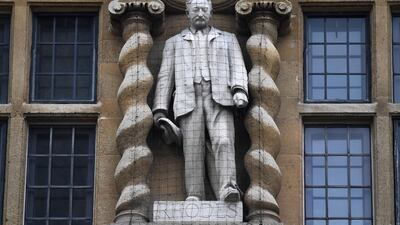A University of Oxford college said it would recommend removing the statue of 19th century colonialist Cecil Rhodes from its facade, the UK's Daily Telegraph reported on Wednesday.
Oriel College had been under pressure for several years from the Rhodes Must Fall movement, a campaign started by students who said the statue of Rhodes glorified racism.
The college had previously resisted calls to remove it.
Rhodes, a politician and mining magnate whose estate pays for a programme of scholarships to the prestigious university that bears his name, was a committed imperialist.
The southern African territory of Rhodesia was named after him until it was changed to Zimbabwe.
The college said that it also wanted to set up an independent inquiry into the "key issues" surrounding the statue.
It said the governing body "expressed their wish to remove the statue of Cecil Rhodes and the King Edwards Street Plaque".
It said the decision was made after "a thoughtful period of debate and reflection".
The campaign to remove the statue was reignited by the global protests after the killing in the US of African-American George Floyd by white police officers.
Campaigners had also demanded changes to the Rhodes scholarship, which has been awarded to more than 8,000 overseas students to study at Oxford University since 1902.
The college said it would examine how to improve access and attendance of black, Asian and minority ethnic undergraduate and graduate students.
The move comes amid renewed scrutiny of monuments to people with links to Europe's colonial past.
Statues have become the focus of anger in recent weeks, most dramatically with the toppling of a memorial to the slave trader Edward Colston in Bristol.
A statue of Britain's wartime leader Winston Churchill was controversially boxed up in London after anti-racism protests.
And in Belgium, protesters have defaced statues of King Leopold II, who ruled with brutality over what is today the Democratic Republic of Congo.
_______________












